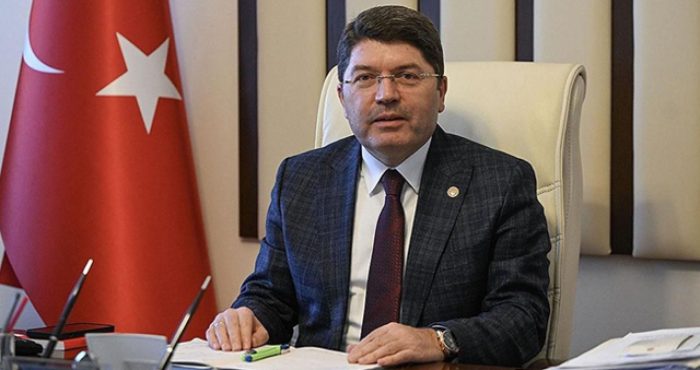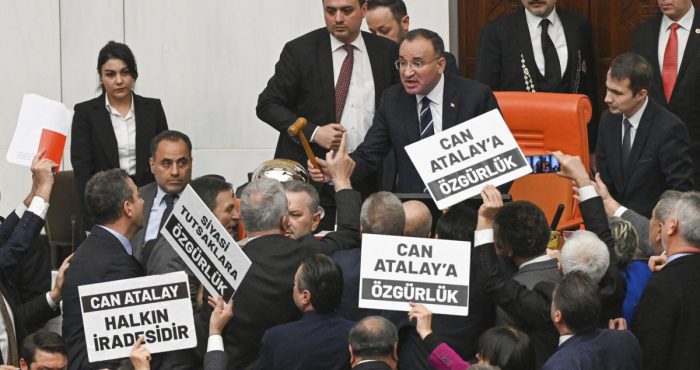On the 12th of September at the Legal Policies Council workshop at the Ulucanlar Prison Museum, President Recep Tayyip Erdogan announced that he had had the draft constitution he will present to the opposition and the public, prepared by the presidency’s bureaucrats. But Erdogan’s statement: “Last year we organised a series of workshops with the participation of scientists and civil society organisations with something to say about constitutional matters. Thereafter… we prepared our own constitutional text” doesn’t reflect the whole truth. Especially when it comes to the preparation of the constitutional draft.
Erdogan’s words on constitution aren’t right
Where Erdogan says “we prepared our own constitutional text” his words are right. A comprehensive news article from the BBC makes this plain. But where he says “we organised a series of workshops with the participation of scientists and civil society organisations with something to say about constitutional matters.” his words are not quite right!
Let me give an example: I’m the president of the non-partisan think-tank called the Better Justice Association (BJA). In 2017 we published a book titled “Turkey’s Middle-Democracy Issues and How to Solve Them”. In 2021 we published another book titled “The A to Z of Turkish Judicial Reform” within which we included constitutional provisions pertaining to the judiciary drafted by ourselves.
In “The A to Z of Turkish Judicial Reform” we propose innovative reforms such as replacing the Council of Judges and Prosecutors with a fully independent Supreme Authority of Justice, establishing Permanent Council of Justice, and removing the condition of permission from one’s superiors currently needed to investigate public officials’ crimes.
We put forward and discussed our innovative reforms, which have seen widespread acceptance internationally, with thousands of people during the nationwide Economy & Law Gatherings we organised.
We sent our proposals to the presidency, Legal Policy Council, Ministry of Justice and hundreds of individual and institutional stakeholders.
It is strange that the BJA was not invited to or even made aware of these constitutional workshops considering our extensive outstanding contributions to the conversation. A number of constitutional lawyers I spoke to were made aware of neither the workshops, nor the work being done to draft a constitution. They weren’t invited either.
They held workshops without anyone’s knowhow
I had a media monitoring services company scan for written, visual and digital media about the workshops conducted in 2022. The Legal Policy Council, chaired by the lawyer Mehmet Ucum, organised 9 workshops on the subject of a new constitution on the 24th of Marc, 21st of April, 26th of May, 23rd of June, 6th and 8th of September, 4th of October, 24th of November, and 15th of December.
However, I was able to determine that they were closed-door.
The Anadolu Agency (AA) published a various news-pieces about workshops completed or planned. Yet apart from one or two of these and a couple of internet publications, these news-pieces were not to be found in the media.
It is impossible to find out who participated in the workshops or made presentations, or to access notes of the discussions, or briefs of outcome or otherwise.
From this it can be understood that the Presidency conducted workshops with bureaucrats, secretly debated and prepared a new draft constitution.
The workshops started in 2021
The preparation of a new constitution began at the start of 2021. An article from the Cumhuriyet published on the 7th of March 2021 states that a “Constitutional Science Council” had been established under the leadership of Presidential Chief Advisor Professor Dr. Yavuz Atar, and that it was planned for the new constitution to “take steps to strengthen the presidential government system while also strengthening the Grand National Assembly (TBMM)”.
Yavuz Atar is a Presidential Chief Advisor and a Chief Delegate to the Presidential Council on Education and Teaching Policies. He is also a member of the Ibn Haldun University Teaching Faculty and the Venice Commission. He completed his doctorate in 1990, in 1995 became an associate professor, and in 2004 a professor. In 2007 he was a member of the Constitutional Science Commission under Prof. Dr. Ergun Özbudun, in 2010 of Higher Education Board (YÖK), and between 2014-2016 was the appointed Chief Delegate of the latter. In 2016, he was made a member of the Constitutional Working Commissions established by the Presidency, Prime Minister’s Office, and Ministry of Justice.
Atar: Erdogan can be elected for a third term
Yavuz Atar, concealing the fact that Article 18(b) of Law 6771 that amended the constitution in 2017 clearly did not allow, said that Erdogan could run for a third term as president. The provision Article 18(b) of Law 6771 that Mr. Atar turned a blind eye states that “[only] the amendments to the Article 101, enter into force with the first [2018] elections”, meaning that “unamended provisions of the Article 101 [such as two term limit] continue to be applicable as before.”
Speaking to the Anadolu Agency on the 2nd of February 2023 saying, in summary, “with the [2017 Referandum], Article 101 of the constitution was removed, with a new Article 101 added, and that despite the content of the provisions being the same, the new Article gives rise to new rights. The two-term limit found in the new arrangement does not have retroactive effect; individuals who have occupied the presidency in previous periods [Erdogan] acquire the right to be elected twice more” commits a fallacy, sweeping the plain and clear meaning of the constitutional provision under the carpet.
Around the dates that the dispute arose, Mustafa Şentop of AKP acting as the speaker of Turkish National Grand Assembly (TGNA) made a claim of the same manner; and despite objections the Supreme Election Council accepted Erdogan’s third candidacy.
Will Atar’s draft be given due regard?
The gist of the matter is that Yavuz Atar is part of the team of AKP and Erdogan supporters that opened the way for Erdogan’s candidacy for a third time by disregarding an unambiguous constitutional provision. Yavuz Atar ignored, also not only Article 88(1) of the Constitution, amended in 2017, that proscribes the executive, or the presidency and bureaucrats from drafting legislation, but also that state bureaucrats are additionally proscribed from drafting legislation for any political party in government or opposition. It is both legally and ethically suspect that he has prepared a draft constitution upon Erdogan’s instruction, uncompliant with law as it was.
From all this it can be easily understood that the draft constitution prepared by Yavuz Atar upon instruction, will further clinch rather than curtail the powers held by Erdogan that have led to unsustainable governance and an unsustainable economy, and that it will continue to keep the judiciary as an extension of the executive.
Hence it can be predicted that Yavuz Atar must have drafted a constitution text that ossifies Erdogan’s powers. Indeed what Abdulkadir Selvi, writer for the Hürriyet newspaper, report in reliance on Yavuz Atar supports such prediction. Mr. Atar provided comprehensive information in August 2021 about the 120-130 provision “improved presidential system” proposal that the AKP is preparing to put before public opinion. Apparently, the new constitution’s draft was prepared and presented to President Erdogan in August 2021.
Bureaucratic Constitution
According to Prof. Dr. Yavuz Atar’s claims the AKP’s proposal of a new constitution will contain the following:
- The new system will be openly called a “presidential system”;
- The system of checks and balances and the legislative, executive, and judicial branches and their functions are being rethought, with an approach that increases the weight of the TGNA being taken to;
- The Presidency will continue to appoint its advisors and ministers as desired, but Parliament will be given the authority to remove said persons from office with an absolute majority and a 3/5th majority in favour of removal; there will be no vote of confidence needed for them to assume office;
- Ministers will give spoken answers to questions in the TGNA
- The TGNA will be given greater influence than the Presidency over the selection of members of the Constitutional Court.
- The principles of the Republic are preserved as is and the inclusion of the separation of powers in the constitutional text is being considered.
- The opening section of the Constitution has been completely rewritten; the will proclaiming and accepting the text is specifically defined as the “Turkish Nation”
- Voters will be able to propose changes to laws and the constitution
- Basic rights and freedoms are being reregulated with the understanding that liberty is the rule and restrictions are the exception, in a manner consistent with universal standards and criteria set out in international treaties, and antidemocratic restrictions in the current constitution are abolished
Bureaucrats cannot serve political parties
President Erdogan, instructing the bureaucrats to draft a constitution and the bureaucrats drafting a constitution in obeyance of that instruction contravenes Article 88(1) of the constitution.
Article 88(1) of the Constitution states “[only] the members of the TGNA have the authority to propose laws”. The phares “and the Ministers Council” was removed from the provision in 2017 in order to prevent the danger of bureaucratocracy, and to make MPs the nation’s true representatives. Article 88(1), in essence, precludes the executive and the state bureaucracy attached to it from drafting legislation, and especially constitutions; its purpose is not just to require MPs to rubber stamp legislative proposals.
The presidential chief advisors Yavuz Atar, Mehmet Uçum, and the bureaucrats comprising the science council, whose wages we all pay through the state’s budget, are obligated to serve not the party in government but rather all of society. Why did these officials oblige and write a constitutional draft for the party in government?
Why, and by what right, when already receiving assistance from the Treasury of the Republic of Turkey, are parties in government getting state officials to write constitutional drafts? Why don’t they have academics working independently from the state draft it? It is legally objectionable for President Erdogan, the head of the executive, to propose a draft constitution prepared by state officials to the opposition.
The executive means the state. The state belongs to everyone; it cannot side with the government just as it cannot oppose the opposition. Erdogan’s dual role as the Chair of the AKP and the state’s executive branch is an obstacle to this. That is because Erdogan cannot escape the constraints placed on him for his executive office by simultaneously occupying the Chair of the AKP.
Mehmet Uçum’s romanticised notion of legitimacy
Mehmet Uçum, a member of the 2nd Istanbul Bar, renowned for its expertise in labour law, played an important role in the 2017 constitutional amendment. He defended the election of the president by the public on the bases of legitimacy. And yet his rationale of legitimacy was insufficient for the public to also choose the Minister of Justice.
It is technically impossible to make a new constitution in 2023. But Uçum, saying “it would have symbolic value”, wants the constitution to be named the “2023 Constitution”, even if made in later years. Uçum has said that even if the new constitution secures the 2/3 majority in the TBMM (400 votes) necessary for its acceptance, that it would nonetheless be put to a referendum for the sake of legitimacy. But according to the current constitution, such a thing isn’t possible unless President Erdogan sees it as necessary.
On the other hand, from within his legitimacy romanticism Mehmet Uçum neglects that a civil constitution could be made through debate an reconciliation, that it cannot be foisted upon the public – whether military or civil -, that a simple majority is insufficient for legitimacy, and that the acceptance of a qualified majority (e.g. 2/3) is needed.
Even more importantly, the legally illegitimate work commenced by the chief advisors of the bureaucrats in question upon President Erdogan’s instruction in contravention of Article 88(1) and the constitutional draft resulting cannot even begin to be considered, and even if it is it will be unsuccessful.
The Hope for a civil constitution must live on
A villager from the hamlet of Dereköy near the town of Bozkir in the province of Konya from whence I hail, whose only asset in life was his donkey, dying for hunger when the villager’s hay store empted in the middle of the winter, implored: “Please don’t die my donkey, don’t die! Just wait ‘til summer comes, then I’ll feed you all the clovers there are!”
The Turkish nation is not helpless like the villager in this laconic tale. It has more than enough human resources, experience and dynamism to create a new civil constitution for itself and even for other countries.
If a new civil constitution is truly desired, then it must be made not with romantic ad ulterior motives, but instead with debate and reconciliation between all segments of public as equals under the leadership of an impartial mediator, with a sound methodology, when the time is right and conditions ripe. Constitutional drafts must be prepared like this. Not by the path taken by President Erdogan and the bureaucrats!
Translated by Charles Ediz Gün




